Experts in global custody gathered at Global Finances offices to discuss the challenges and opportunities in their markets.
GLOBAL FINANCE:

There are new and more powerful forces pushing consolidation today. What impact will this have on your business and your customers businesses?
PADELFORD LATTIMER,
first vice president, Mellon: Among custody-only providers we expect to see more consolidation. Firms that are offering the global range of services, though, are a totally new ball game.We provide a much broader range of information services. There is a whole different sharing of risk.The way that we price and structure fees for the businesses that we are in now is very different. Even the definition of scale has changed: Assets under custody are a certain part of that, but how you use technology, the caliber of your people, the breadth of your product set all come into play in really describing the scale that you have.
PATRICK CURTIN,
executive vice president, The Bank of New York: I call it the investment information creation industry, and the industry is still ripeeven within that smaller subsetfor more consolidation. Over the next three years well probably see the landscape extend even further.
STEVEN J. APPELL,
senior vice president, Northern Trust: The pace of consolidation has slowed, but the customers are still benefiting; particularly, pricing continues to be a key issue among those that are left. Still, those custodians that invest in the technology and are firmly committed to this business will continue to see opportunities generated by any additional consolidation. Clients want stability. And they want a custodian that can evolve and invest in the technology to meet their changing needs.
MARY KAY ORR,
senior vice president, JPMorgan:With the increased regulatory oversight and the associated costs, firms need to have more scale and a broader range of products.Were going to see more consolidation on the investment management side, and that has implications for investment servicing providers. If you are serving a market segment that is consolidating, there will be acquirers and firms that are acquired. If you are well aligned and servicing the firms that are doing the acquiring, then there is the potential to grow with them as they have more success. It requires the providers to the industry to have broad, robust solutions and products. You cant be a niche provider in that segment for the long term. In certain cases, theyre going to require outsourcing solutions, which raises the bar for investment in technology and product and requires finely honed skills in terms of product integration.

TIMOTHY J. CONNELLY,
partner, BBH: In order for the customer to have a better experience, consolidation isnt the issue; its how the consolidated pieces fit together to deliver the customer experience. Its very important to have a vertical array of products that satisfy customer needs. To the extent that it all works, it is a positive thing, but the jury is still out on that one.
SCOTT R. FITZGERALD,
senior vice president, State Street: From a client perspective, clients can benefit from the smaller acquisitions that investment service providers make, where a company picks up a capability they did not have, they hadnt organically built or one they werent able to build in a timely fashion. Weve seen some of that over the past few years, and well continue to see some of it.
GF: What impact will consolidation and other changes among custodians customers in the investment management industry have?
LATTIMER:
The challenge here is that people havent been that good at consolidating asset managers yet. Rolling up asset managers and trying to get scale out of the investment process is a different thing in our businesses. So you do see a lot of investment managers splitting up and forming small shops. That presents some opportunities, because in many instances theyll be alternative investments. If youre looking at the larger managers who are going to consolidate, the challenge is whether you have the products to support them: Can you create a viable financial proposition, because theyre going to have a lot of leverage.
ORR:
As you see consolidation on the client side, you will see the emerging firms come out with a broader product set. It requires a broader set of capabilities on the part of the global investment services, and those capabilities may not be aligned with their core competencies. In many cases, acquisitions are as much about talent as about product capability.
APPELL:
Well continue to see more consolidation in the investment management industry. The ultimate benefit to the client of all this consolidation will be the ability to leverage a bundled offering. That is also the driver for acquisitions because they allow a firm to cross over into that client base for our other array of products and relationship-price the entire product array.
FITZGERALD:
Well certainly see more acquisitions in that space. Performance has not been strong for many firms. The regulatory climate is also making it so costly, especially for midsize to small firms, and will put pressure on them to get to some level of scale where they can be more competitive.
GF:
The reevaluation of how investment managers run their businesses has increased interest in outsourcing. Whats the latest in this area?
CURTIN:
The notion of clients focusing on their core competencies and finding a service provider to do that which they dont have scale or a particular skill in is something we have seen for a while. But its picking up some speed as a result of some of the things we dealt with in the last question in terms of consolidation among service providers.
FITZGERALD:
Probably 60% or 70% of the top 50 firms in the fund management industry outsource for accounting, so its a natural progression for them to look at other things that maybe a sole provider custodian administrator can do for them. The scale of the services will expand to include fund administration, middle-office investment operations, performance measurement, compliance and corporate governance support. On the insurance side, not much has been outsourced to date, but its going up, and now that they have alternatives in the market, it will continue to grow.On the investment accounting side, insurance is a growth market.
LATTIMER:
As we move more into outsourcing the middle officethe investment processwell see very different functions outsourced than have been in the past.Were going to need a different set of skills to take on these new functions, and its also a very different relationshipmuch more interactive. And we have to figure out how to get paid for the risk and efforts were taking on now, because custody may not be enough of a currency to compensate you.
ORR:
In the States youll find far more interesting, unbundled solutions, com- ponent solutions that can really be plugged and played into a firms investment operation. In Europe there has been more of a move to lift-out. As an industry we have to have a more open conversation about risk and about return. In our drive to grow the business and service our clients, we have not always been thoughtful enoughdisciplined enoughin having that conversation publicly with the industry and with our clients.
CONNELLY:
As technology develops, customers are better able to put in place modular strategies so they retain an element of control while maintaining a proper series of checks and balances between themselves and their vendors.
APPELL:
Those players with the right technology that can offer a continuum of services, that allow fund managers to pick and choose between full or partial outsourcing services, will benefit the most, because we are finding that each opportunity is different, and most fund managers need a customized approach.
GF:
Funds committed to alternative investments continue to grow. How does this affect custodians?
CURTIN:
It affects us in two key ways. One, the needs of the managers of alternative investment portfolios are very, very different from the traditional mutual fund complex.Two, there has been a significant move on the part of plan sponsors into alternative asset classes and at the same time a greater need and desire on their part to be able to understand whats in those portfolios. Custodians, in many instances, are being looked to as the potential providers of that kind of information from the beneficial owners of the assets.
LATTIMER:
Firms that traditionally service hedge funds did a good job, but its different from the assets-servicing environment we know for other vehicles. Plan sponsors, foundations and endowments want a lot more transparency. They want the administrator to ride shotgun for them. But there may be some lack of ability to ride shotgun so, from a custodian perspective, its a big opportunity.
FITZGERALD:
That has already begun. For our clients, we have to be in that space; they look to us to be in that space. Some of us have developed the technology, the people, the expertise to get in to help our clients and to offer a broader service mix to our customers.
APPELL:
We looked at whether you buy expertise or make an alliance to get that capability. These products tend to be valued more than just straight custody, so you can basically generate different types of fee income from specialized reporting as required.
CONNELLY:
Alternative investments have a positive effect on all of our businesses in that it diversifies our product mix and dampens the susceptibility our earnings have to the general market. Investors and custodians like these instruments because they act in a countercyclical manner to long-only investments.
ORR:
Hedge funds account for 3% of the worlds investible assets and 30% of the trading volume on the worlds exchanges. If you are going to move into that space, its not only about administration and record-keeping and accounting but the ability to execute and to manage that kind of flow to settle efficiently. To do it in a way that minimizes the risk on the street is paramount. That requires investment capital and talent.

GF:
How will cross-border investment activity change in the future?
ORR:
This industry is simply going to grow, and its going to continue to require complex, innovative solutions across a broader set of products. The US-based managers have brought to the European landscape some new practices, however, and you are also going to see some emerging trends over the next three to five years that build on some of the innovative developments here in the States and leverage the compatible investment and architecture in Europe.
CONNELLY:
The next generation of offshore investment expertise will center around the vehicle itselfhow one offers advice to clients as to which cross-border vehicle to use.Thats where the demand for expertise and talent and skills will be over the next few years.
LATTIMER:
Youve got an individual equity investor culture awakening in Europe.The growing demand for capital in India and China will continue to create opportunities for US investors. The liberalization of investment guidelines in Latin America is driving foreign investments. All these will continue to drive cross-border activity. At the end of the day you still need an optimized basket of risk. The only way to get that is by investing globally.
APPELL:
From a custody perspective, we are now seeing the next product evolution, with the implementation of some of the first true multinational pension pooling vehicles, with custodians offering offshore vehicles with tax transparency that give multinationals the ability to pool, and invest and gain efficiencies, savings and transparency.
FITZGERALD:
Some of the biggest firms in the world are based in Europe, and we are seeing a tremendous amount of activity there. A few years back we saw them flex their muscles in the insurance space, buying insurance properties in the USvery global firms requiring capabilities worldwide. And one of the drivers of State Street making the Deutsche Bank acquisition was to add capabilities that will support those clients globally. It has already proven to be very effective, so well see more of that type of activity.
GF:
The regulatory environment around the world has become more complex and demanding; however, many of these changes, burdensome as they are, may have created opportunities for custodians to offer services to clients.
CONNELLY:
Brown Brothers is particularly active with regard to complianceofficer support. Customers could or should outsource support, yet not the entire function. It remains to be seen if this legislation benefits the actual shareholders at the end of the day versus the associated costs.
CURTIN:
I think the costs associated with the new regulatory environment will offset, in the near term, any opportunities that are presented as a result.We have seen the pendulum swing very, very sharply to an atmosphere not even of regulation but almost of enforcement.
FITZGERALD:
Its expensive and complex for our customers to adhere to some of these regulations.We as custodians are in a position to help them, and although the service is not without cost, we can deliver economies of scale.
LATTIMER:
Were still starting to understand the new regulatory environment how some of the risks are shared, some are transferredand there is a lot to be learned.Weve stepped up to the plate in terms of supporting our clients. There are still questions from a financial gain perspective, though.
ORR:
As we have evolved our capabilities to meet the new SEC requirements, weve found those particular products have applications in a broader range of market segments.There is an opportunity to take that thought leadership from one market and apply that learning to other sectors, both in the States and globally.
APPELL:
Its a matter of investing in the technology and the people to not only understand these new regulations, but to also understand how to help them comply with the new regulations.

GF:
Whats happening to pricing in this market? Has downward pricing been replaced with other pricing of financial structures that are acceptable with clients, like upward pricing?
CURTIN:
The principles of microeconomics have been defied here.The supply curve has shifted in. The demand curve has stayed the same, and pricing hasnt gone up.
APPELL:
The way industrial consumers think about pricing has changed. Clients now just want basis point or market value pricing, and that shifts risk back and forth between the consumers and the providers. It has become a business challenge in managing the portfolio of pricing strategies.
LATTIMER:
How do you manage and apply the appropriate pricing structures because, in many instances, you have moved away from a fee schedule or a rate card? The concept of relationship pricing brings a lot of complexity to the pricing process today, too.
ORR:
Relationship pricing is not something that can be sustained in the long term in this industry. It will not bear regulatory scrutiny. Over time we are going to have to work with our clients to figure out how we price services in a way that actually reflects the cost driver of the service but at the same time looks at value in an equitable way to our clients.
FITZGERALD:
In the mutual fund industry thats very applicable. They want more transparency in pricing, and I think that benefits us. It should be easier to get paid for our services appropriately if our clients are crystal clear as to what we are providing and the value that were providing to them.
CONNELLY:
Pricing is also productbased. For example, how quickly will asset flows move from traditional mutual funds to ETFs and index funds, because pricing dynamics for these vehicles may be different? Consumer behavior will affect our pricing.
DAN KEELER



